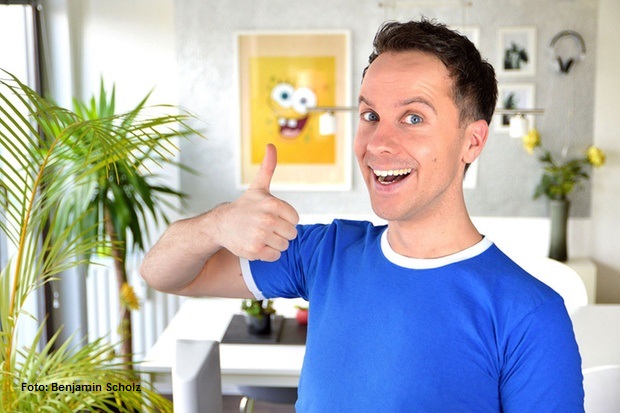Ben Scholz visits school classes to talk about sex on a voluntary basis. When the Cologne native realised at some point during his sex education lessons that he was being asked the same questions over and over again by the pupils, he launched his portal in 2014. jungsfragen.de. In specially produced videos there and on his own YouTube channel, Ben answers everything that might interest his core target group, boys aged between 12 and 16.
Ben, do you notice a sense of shame among boys in schools when it comes to talking about HIV, other STIs and relevant tests at the doctor?
I can't really confirm that. When I talk about these topics in class, I tend to notice that the pupils are more alert and want to know everything in detail. My impression is that the awareness of the health risks of sex is definitely there or comes to light once you have shaken them up and told them: unfortunately, HIV and AIDS still exist. People often ask me where they can still get a rapid HIV test in the city as soon as I tell them about it.
Are there also gay boys in the classes who are quite normal about it or do pupils still find it difficult to say to their mates in class: "I'm different from you, I'm gay"?
It's a shame, but even in 2016 we are still far from being in a situation where you can just come out at school. That's why gay boys are usually less concerned with classic sex topics and more with themselves and their identity, which many are sceptical about. The shame is still pretty great.
Do you realise this directly in your sex education lessons?
Yes, over time I've noticed that some boys are really introverted when it comes to homosexuality and do everything they can to avoid making eye contact with me. All this happens out of fear that someone might "find out" after all. Incidentally, the same thing also happens when I talk about foreskin constriction. When one of the boys realises "Oh dear, that's exactly how it is with me", you quickly notice how they mentally leave the lesson. So there are a few topics where the shame is really big. Although, of course, this always has something to do with the class community.
You're not just in classes, you also run the portal jungsfragen.de. Do many gay boys also seek advice there?
Yes, a lot of them actually. Gay kids in particular often have one big question: "How can I come out?". It's often a long way before they have sex for the first time. Nevertheless, it is of course important to talk about safer sex and specific sexual practices beforehand. Just as it often happens much more naturally with heterosexuals - even in the school playground.
Is there also a risk that gay boys will have their first sexual experiences much more "secretly", precisely because they don't dare to talk about it with friends?
In any case. Unfortunately, unlike their straight mates, they can't usually boast that they were deflowered the night before. Everything happens very differently. This also plays a major role when it comes to the question of a visit to the doctor, for example after a high-risk contact. How do I tell the doctor? How will he react to the gay contact? It often takes more time than with straight people to realise that they are doing the most normal thing in the world.
Do you have any general tips and tricks for guys who are still at the beginning of their sex life?
Firstly, I'd like to make it crystal clear: sex is great, sex is fun and it's the best thing in the world. But it's also true that you can catch something during sex. But of course I also reassure people. Fortunately, most things are easily treatable. Even HIV is known to have very good treatment options. My rough rule of thumb is: "If you have a pleasurable sex life with different people, you should have all the usual tests and examinations regularly, about once a year."
Another tip is to consult a doctor as soon as you have had any risk contact or notice any changes in your own body. Because the quicker the diagnosis, the better and easier the treatment. For example, if a boy writes to me that he has a pimple on his penis but doesn't want to go to the doctor, I sometimes get quite direct and say: 'Yes, well, you'll just have to live with the fact that your willy will fall off. That way they understand directly, because wrapping them in cotton wool doesn't help.
Last question: How did it come about that you are so relaxed about all these sex topics today and don't feel any shame?
I just realised at some point that sex is the most normal thing in the world. Everyone does it, everyone masturbates and why shouldn't we talk about something that unites us all so much?
How the test heroes feel about "shame", you can find out in the test hero clip.
You can find all the young questions here: www.jungsfragen.de










